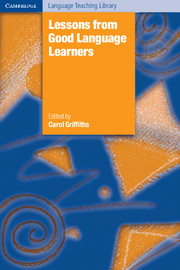Book contents
- Frontmatter
- Contents
- List of contributors
- Acknowledgements
- Editor's overview
- Prologue
- Reflections
- Part I Learner variables
- 1 Motivation and good language learners
- 2 Age and good language learners
- 3 Learning style and good laguage learners
- 4 Personality and good language learners
- 5 Gender and good language learners
- 6 Strategies and good language learners
- 7 Metacognition and good language learners
- 8 Autonomy and good language learners
- 9 Beliefs and good language learners
- 10 Culture and good language learners
- 11 Aptitude and good language learners
- Part II Learning variables
- The learners' landscape and journey: a summary
- Index
9 - Beliefs and good language learners
Published online by Cambridge University Press: 11 August 2009
- Frontmatter
- Contents
- List of contributors
- Acknowledgements
- Editor's overview
- Prologue
- Reflections
- Part I Learner variables
- 1 Motivation and good language learners
- 2 Age and good language learners
- 3 Learning style and good laguage learners
- 4 Personality and good language learners
- 5 Gender and good language learners
- 6 Strategies and good language learners
- 7 Metacognition and good language learners
- 8 Autonomy and good language learners
- 9 Beliefs and good language learners
- 10 Culture and good language learners
- 11 Aptitude and good language learners
- Part II Learning variables
- The learners' landscape and journey: a summary
- Index
Summary
Beliefs may not be the first thing that come to mind when reflecting on the good language learner – the role they play may not be as immediately obvious or evident as that of learning strategies or motivation for example. Nonetheless the nature and effects of learner beliefs on language learning have been increasingly recognized since Joan Rubin's 1975 depiction of the good language learner (GLL): beliefs are important because learners hold their beliefs to be true and these beliefs then guide how they interpret their experiences and how they behave. Beliefs can be defined as “mental constructions of experience” (Sigel, 1985, p. 351), which are not only cognitive constructs but also social constructs arising from experience. Benson and Lor (1999) observe that beliefs are always contextualised in relation to some learning task or situation and that beliefs articulated by students are not necessarily held under all circumstances. They conclude that beliefs “can be understood as cognitive resources on which students draw to make sense of and cope with specific content and contexts of learning” (p. 462). In terms of language learning, the domains of beliefs which are acknowledged as relevant are the beliefs learners hold about themselves, about language and language learning and about the contexts in which they participate as language learners and language users.
The idea of the good language learner sprang from questions about how more successful learners approached language learning tasks and the facilitating strategies they brought to the process of learning a language.
- Type
- Chapter
- Information
- Lessons from Good Language Learners , pp. 121 - 130Publisher: Cambridge University PressPrint publication year: 2008
- 15
- Cited by



